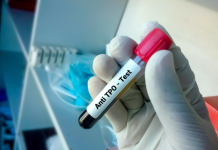A lot of people are battling thyroid disease and thyroid treatment has been helping these people live healthy life. Your thyroid produces hormones that are responsible for regulating many different functions of your body, including metabolism, heart rate, and body temperature. When these hormones are produced in small or large amounts, it causes thyroid disease. The purpose of thyroid treatment is to mimic the normal function of the thyroid as closely as possible.
The thyroid disease is of different types, including hypothyroidism, hyperthyroidism, Hashimoto’s thyroiditis, and thyroiditis. Sometimes, we tend to confuse thyroid disease symptoms with other conditions, making it difficult to diagnose. Fortunately, if you have the slightest doubt that you could be developing thyroid disease, you can get the T3-T4-TSH test done. The test measures the hormones from the thyroid gland along with thyroid-stimulating hormone (TSH). The pituitary gland releases TSH that is responsible for triggering your thyroid.
If your TSH levels are high, it means that there is less production of thyroid hormones and your body is telling your thyroid gland to make more of them. This condition is called hypothyroidism.
Hyperthyroidism is exactly the opposite. In this type of thyroid disease, the thyroid hormones levels are high and the TSH levels are below normal.
Thyroid Disease Treatment
Post diagnosis, your doctor will decide the thyroid treatment on the basis of your thyroid condition with the goal of returning your thyroid hormone levels to normal.
If you have hypothyroidism, the common treatment option is:
- Thyroid replacement medication: A drug replaces the missing amount of thyroid hormones that your body isn’t making. Patients can orally take the synthetic hormones, in a pill form. The most common medication used is Levothyroxine.
If you have hyperthyroidism, your thyroid treatment options include:
- Medications: Doctors prescribe anti-thyroid drugs like Propylthiouracil and Methimazole to decrease the production of hormones. These medicines prevent the hormone release from the thyroid gland.
- Beta-blockers: These types of medications help control the thyroid symptoms and don’t change the hormone levels in the body.
- Radioactive iodine: This treatment method prevents the thyroid gland from producing a high number of thyroid hormones by damaging the thyroid cells.
- Thyroid surgery: The removal of a hyperfunctioning nodule within the gland or a large goiter using surgery. Thyroidectomy is the process of surgical removal of the thyroid gland. However, after the removal of the thyroid gland, you will have to take synthetic thyroid replacement hormone for life.
Usually, treatment is available for managing thyroid diseases. Making healthy lifestyle changes can go a long way in helping you live a quality life with a thyroid disorder. There’s much you can get from clean eating, regular exercise, and controlling stress.










